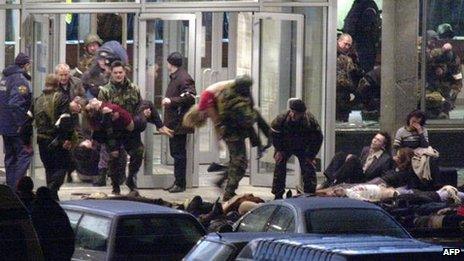Moscow theatre siege: Questions remain unanswered
-
Published

Ten years ago Russia and the world held their breath as Russian special forces surrounded a theatre where nearly 1,000 people were held hostage. The siege ended in tragedy, and still provokes recriminations.
On 23 October 2002, 40 Chechen militants headed by warlord Movsar Barayev took 912 hostages at the Dubrovka Theatre in Moscow, where the popular musical Nord-Ost was showing.
Three days later Russian security services pumped sleeping gas into the hall, stormed it and killed all the attackers.
But some 130 hostages died - most not at the hands of the gunmen and women, but apparently because of the effects of the gas.
Ten years later, many questions remain unanswered, and many people feel the victims have not received justice.
No warning
Many experts say that the operation itself was carried out in a professional way, but that people's safety was sacrificed in order to maintain total secrecy.
Public health services were not warned in advance, and police did not clear the nearby streets of parked vehicles, so ambulances arrived at the scene an hour-and-a-half after the start of the operation.
Sleeping hostages were carried not by medics, but by policemen. The authorities did not acknowledge the use of gas until eight hours later, and even then did not disclose what type of gas it was, so that doctors did not know how to treat the patients.
The Moscow chief public health doctor Andrey Seltsovskiy and President Vladimir Putin himself insisted that the gas could not have caused death, but its name and chemical formula remain secret.
Many have assumed it was a compound based on fentanyl - an opioid that can be hundreds of times more potent than morphine. It can cause a fatal heroin-like overdose - but the symptoms can be reversed with the drug naloxone.
No investigation
The execution of the hostage-taking operation itself raised questions in many Russians' minds.
Forty Chechen rebels arrived in Moscow with more than 100kg of explosives, about 100 hand grenades, three heavy bombs, 18 Kalashnikov assault rifles and 20 pistols.
Journalists, rights activists and general public wondered how they managed to do this, and guessed that rebels bribed policemen at road checkpoints.
All the attackers were shot dead, presumably when they were unconscious. The only person to face open trial, Zaurbek Talkhigov, was charged with assisting the preparations for the attack and sentenced to eight-and-a-half years in prison.
The actions of the authorities during the crisis were not investigated. Nobody was brought to account for the deaths of 119 people in hospital after the liberation operation was completed, or the inability of intelligence services to prevent the attack.
Mr Putin, by a decree which was never officially published, awarded FSB deputy director Vladimir Pronichev, who managed the operation, the title of Hero of Russia.
Efforts by MP Sergey Yushenkov to carry out parliamentary hearings were blocked by the pro-Kremlin majority.
According to the results of a 2010 opinion poll, 74% of Russians did not fully trust the official version of events.
A group of victims and their relatives sued the Russian government, demanding an open investigation into the case and declassification of the relevant information. In January 2003 the Tverskoy court in Moscow rejected the claims.
In December 2011, the European Court of Human Rights in Strasbourg ruled in favour of 64 victims and ordered the Russian government to pay them about a million euros in compensation.
The court found that the Russian authorities did not prepare the rescue operation in a proper way.
Tightened grip
Following the Strasbourg court ruling, the claimants' lawyer Igor Trunov in July 2012 asked the Russian Investigation Committee to re-open the criminal case and re-start the probe, but has received no answer so far.
But doubts over the handling of the crisis have not undermined President Putin. On the contrary, like other crises and catastrophes in Russia, the effect has often been to consolidate his grip on power.
The Kursk submarine tragedy in 2000 was followed by the re-establishment of state control over the First television channel.
The 2004 Beslan school massacre resulted in the cancellation of elections for regional governors.
During the Moscow theatre siege, Mr Putin was reportedly angered by the NTV television channel showing a rally by desperate relatives, demanding that Russia give in to the militants' demands and withdraw from Chechnya.
Soon afterwards, its director-general Boris Jordan was fired, and thereafter NTV lost any independence and objectivity.
-
-
Published26 October 2005
-